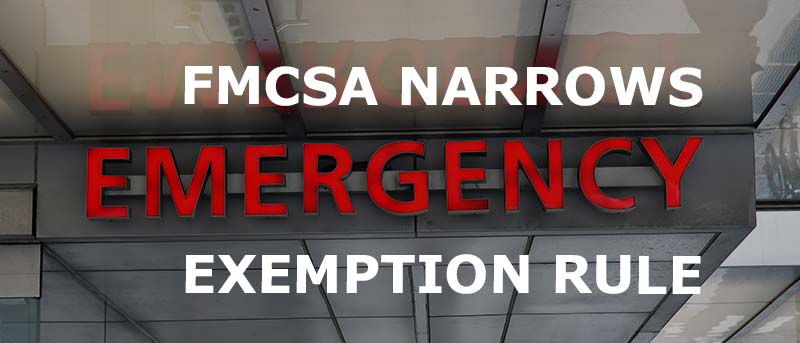Furry Friends Cause Trucking Border Delays At Canadian Border
To prevent reintroduction of rabies carried by dogs into the United States, new CDC regulations require proof of healthy pets at border crossing. Truckers who
We are a team of DOT Compliance and Licensing Professionals helping trucking and transportation companies remain safe, compliant, and profitable.
CNS or Compliance Navigation Specialists is DOT Compliance company that assists trucking and transportation companies remain DOT Compliant. We are part of a network of companies, CNS Companies, specializing in services related to the transportation, manufacturing, construction, service, education and medical industries.

A full-scale DOT Compliance Program managing a long haul carrier’s safety, compliance, licensing and more.
Learn more >>>
A DOT Compliance Program that keeps motor carriers compliant with the 6 Basic DOT Regulations required of all carriers.
Learn more >>>
Our Short-Haul/Construction Program is a full-scale program designed for private carriers that do not haul for-hire.
Learn more >>>
Our most comprehensive DOT Compliance Program, operating as your company’s off-site Safety Director or assisting your current safety personnel.
Learn more >>>
Our Non-CDL Program is a full-scale program managing safety, compliance, licensing and more for moving companies, couriers, landscapers, or any company subject to DOT regulations and does not employ CDL drivers.
Learn more >>>
Our DOT Audit Services cover a number of different types of DOT Audits that new and existing carriers will be subject to.
Our DOT Driver Services help trucking companies and carriers to stay compliant as they grow and hire more drivers.
Our DOT Vehicle Services focus on ensuring your vehicles are compliant with DOT Regulations, which is just as important as your drivers.
Our DOT Services for Special Carriers focus on companies outside of the typical motor carrier, like HAZMAT, Passenger and Bus Carriers.
CNS is part of a group of companies that offer other necessary services for the trucking and transportation industry, such as Commercial Trucking Insurance, CDL Training, Online Training Course, and even Healthcare.
Our DOT Licensing Services will cover you whether you are an existing company or just starting a trucking company. Our DOT Licensing Specialists can help you get up and running and in days with your DOT number, MC Authority, EIN, UCR, IFTA, 2290 HVUT, Fuel Taxes and can even set you up to get your Commercial Driver's License (CDL) with CNS Driver Training Center.
Our DOT Licensing Specialists will help you with every aspect of starting a trucking company. All you need to do is choose a name for your trucking company.
You will need to ensure your DOT Number, MC Authority, Vehicle Registration, etc. is all set up properly when you start your trucking business.
Our Licensing Specialists can help with all aspects of filing and renewing licenses, fuel taxes, etc.
CNS is part of a group of companies that offer other necessary services for the trucking and transportation industry, such as Commercial Trucking Insurance, CDL Training, Online Training Course, and even Healthcare.
To prevent reintroduction of rabies carried by dogs into the United States, new CDC regulations require proof of healthy pets at border crossing. Truckers who
CNS or Compliance Navigation Specialists is DOT Compliance company that assists trucking and transportation companies remain DOT Compliant. We are part of a network of companies, CNS Companies, specializing in services related to the transportation, manufacturing, construction, service, education and medical industries.
CNS Companies is a network of companies specializing in services related to the transportation, manufacturing, construction, service, education and medical industries. Our DOT Compliance division is handled by Compliance Navigation Specialists, CNS Insurance handles Commercial Truck Insurance, CDL training is managed by the CNS Driver Training Center and healthcare is managed by CNS Occupational Medicine.
We are a team of DOT Compliance and Licensing Professionals helping trucking and transportation companies remain safe, compliant, and profitable.
CNS or Compliance Navigation Specialists is DOT Compliance company that assists trucking and transportation companies remain DOT Compliant. We are part of a network of companies, CNS Companies, specializing in services related to the transportation, manufacturing, construction, service, education and medical industries.

A full-scale DOT Compliance Program managing a long haul carrier’s safety, compliance, licensing and more.
Learn more >>>
A DOT Compliance Program that keeps motor carriers compliant with the 6 Basic DOT Regulations required of all carriers.
Learn more >>>
Our Short-Haul/Construction Program is a full-scale program designed for private carriers that do not haul for-hire.
Learn more >>>
Our most comprehensive DOT Compliance Program, operating as your company’s off-site Safety Director or assisting your current safety personnel.
Learn more >>>
Our Non-CDL Program is a full-scale program managing safety, compliance, licensing and more for moving companies, couriers, landscapers, or any company subject to DOT regulations and does not employ CDL drivers.
Learn more >>>
Our DOT Audit Services cover a number of different types of DOT Audits that new and existing carriers will be subject to.
Our DOT Driver Services help trucking companies and carriers to stay compliant as they grow and hire more drivers.
Our DOT Vehicle Services focus on ensuring your vehicles are compliant with DOT Regulations, which is just as important as your drivers.
Our DOT Services for Special Carriers focus on companies outside of the typical motor carrier, like HAZMAT, Passenger and Bus Carriers.
CNS is part of a group of companies that offer other necessary services for the trucking and transportation industry, such as Commercial Trucking Insurance, CDL Training, Online Training Course, and even Healthcare.
Our DOT Licensing Services will cover you whether you are an existing company or just starting a trucking company. Our DOT Licensing Specialists can help you get up and running and in days with your DOT number, MC Authority, EIN, UCR, IFTA, 2290 HVUT, Fuel Taxes and can even set you up to get your Commercial Driver's License (CDL) with CNS Driver Training Center.
Our DOT Licensing Specialists will help you with every aspect of starting a trucking company. All you need to do is choose a name for your trucking company.
You will need to ensure your DOT Number, MC Authority, Vehicle Registration, etc. is all set up properly when you start your trucking business.
Our Licensing Specialists can help with all aspects of filing and renewing licenses, fuel taxes, etc.
CNS is part of a group of companies that offer other necessary services for the trucking and transportation industry, such as Commercial Trucking Insurance, CDL Training, Online Training Course, and even Healthcare.
To prevent reintroduction of rabies carried by dogs into the United States, new CDC regulations require proof of healthy pets at border crossing. Truckers who
CNS or Compliance Navigation Specialists is DOT Compliance company that assists trucking and transportation companies remain DOT Compliant. We are part of a network of companies, CNS Companies, specializing in services related to the transportation, manufacturing, construction, service, education and medical industries.
CNS Companies is a network of companies specializing in services related to the transportation, manufacturing, construction, service, education and medical industries. Our DOT Compliance division is handled by Compliance Navigation Specialists, CNS Insurance handles Commercial Truck Insurance, CDL training is managed by the CNS Driver Training Center and healthcare is managed by CNS Occupational Medicine.

This rule provides clarity on which exemptions are necessary during an emergency, help track exemption requests more efficiently, and ensures the public continues to benefit from the other important safety requirements in parts 390 through 399.
After 3 years of COVID pandemic hours-of-service waivers, FMCSA is planning to place limits on the amount of regulatory relief that is granted when an emergency declaration is declared.
On Tuesday, October 10th, the FMCSA announced a final rule that would narrow the scope of safety regulations from which relief is automatically provided for motor carriers and drivers providing direct assistance when an emergency has been declared.
This rule changes the definition of emergency under § 390.23 to clarify that “emergency regulatory relief” generally DOES NOT apply to economic conditions that are caused by market forces, including:
However, it would be an emergency if these conditions or events “cause an immediate threat to human life”.
While they acknowledge that the use of emergency declarations has not yielded negative safety results, the goal would be to ensure that the relief granted “is appropriate and tailored” to the specifics of the circumstances and the emergency being addressed.
This final rule revises the Federal Motor Carrier Safety Regulations to:
Direct assistance terminates when a driver or commercial motor vehicle is used in interstate commerce to transport cargo not destined for the emergency relief effort, or when the motor carrier dispatches such driver or commercial motor vehicle to another location to begin operations in commerce.
The final rule will take effect 60 days after it is published in the Federal Register, around December 11, 2023.
Emergency means:
Emergency does NOT include:
If you thought the government would be out of your hair, guess again! It’s hard to stay on top of all the rules, regulations, and changes.
So, join our monthly newsletter and stay up to date on trucking industry news and receive important compliance and licensing tips.
Did you know we can be found on YouTube or any Podcast channels!
Don’t miss out. Subscribe: Apple Podcasts | Spotify | Stitcher | YouTube

EPA’s new truck emission standards will require 25% of new sleeper-cab tractors to be zero-tailpipe-emission trucks by 2032. On March 29, 2024, the U.S. Environmental

Did you know that there have been more than 3.4 million brakes inspected since the program’s inception in 1998? As we prepare for CVSA’s Brake

CVSA scheduled Brake Safety Week from Aug. 25-31 with the focus of this year’s inspections around the condition of brake linings and pads. After last year’s strange

The passage of Prop. 22 saved Uber, Lyft, and other gig workers from AB5, spending more than $200 million to write their own labor law…
Our DOT Compliance Programs ensure it is your top priority and keeps your business running.
Receive the latest transportation and trucking industry information about FMCSA and DOT Audits, Regulations, etc.

EPA’s new truck emission standards will require 25% of new sleeper-cab tractors to be zero-tailpipe-emission trucks by 2032. On March 29, 2024, the U.S. Environmental

Did you know that there have been more than 3.4 million brakes inspected since the program’s inception in 1998? As we prepare for CVSA’s Brake

CVSA scheduled Brake Safety Week from Aug. 25-31 with the focus of this year’s inspections around the condition of brake linings and pads. After last year’s strange
Join our monthly newsletter and stay up-to-date on trucking industry news and receive important compliance and licensing tips.
Join our monthly newsletter and stay up-to-date on trucking industry news and receive important compliance and licensing tips.